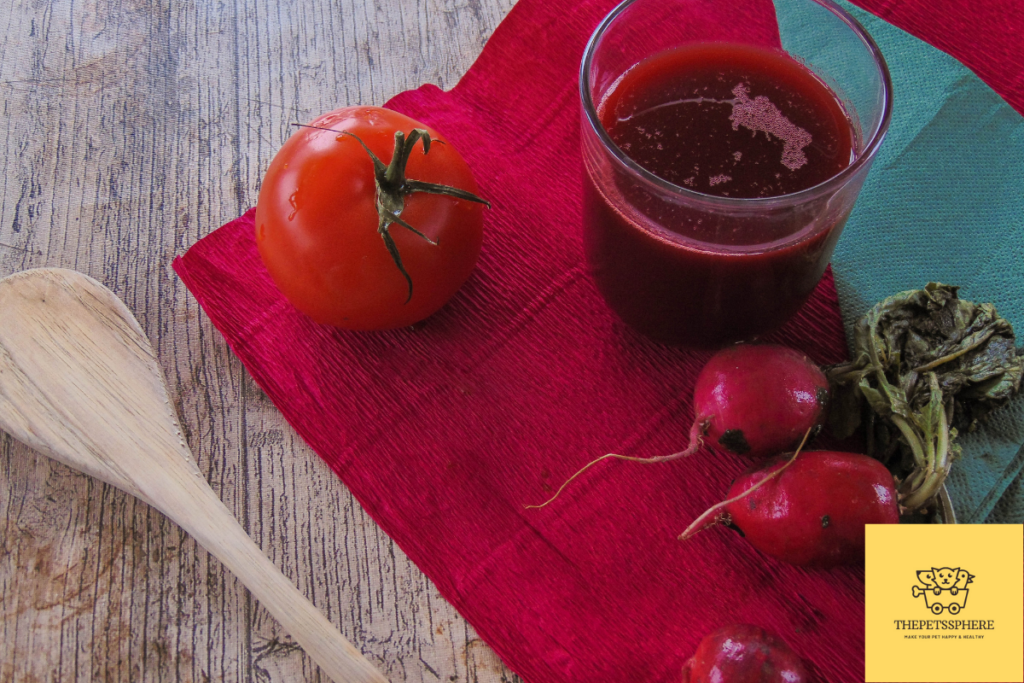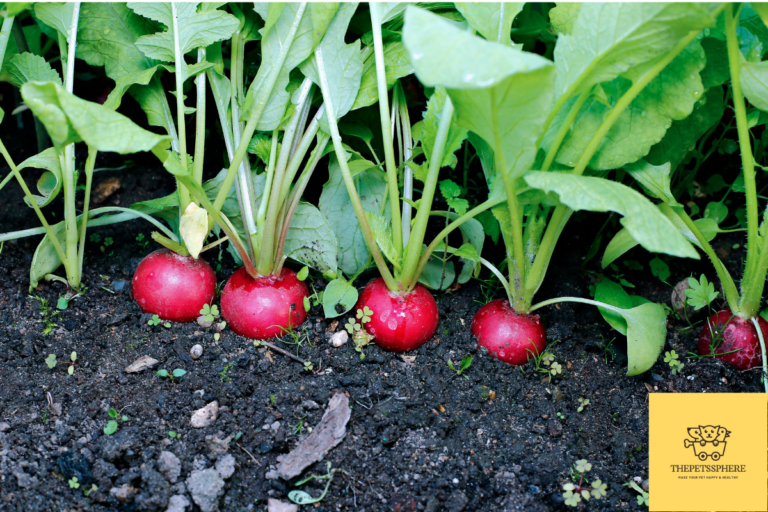Can cats eat radishes? This can be a question that can have you scratching your head and looking for the answer. In this article, we will talk about can cats eat radishes in detail. We will also share some risks of feeding radishes to your cat. Lastly, we will share how to feed radishes to your cat safely.
Cats can safely consume radish. You can offer it in either salad or soup format with chicken.
If you can’t find anything else to feed with their main diet, then radish is a good option.
Just make sure that they don’t get too much of it since it can cause diarrhea and other complications. Another alternative would be to use celery or carrots, but be sure they can tolerate the taste of those two vegetables.
Are Radishes Safe for Cats?
Cats are curious creatures that will eat anything. But some things can make them sick, like onions and garlic.
Radishes, on the other hand, are safe for cats to snack on. They contain vitamin C which is good for their immune system and they have a low-calorie count so even if your cat does overindulge you won’t need to worry about obesity or diabetes. If you’re looking for something new to feed your feline companion then try radishes today!
Health Benefits of Feeding Radish to Your Cat
If you’re a cat lover, you may have heard the rumor that feeding radish to a cat can help them pass hairballs more easily. There are many benefits of feeding your cats radish, including 5 major ones listed below.
1) Radishes give off heat when they are eaten by cats which helps them digest their food and get rid of hairballs faster.
2) The water content in radishes is important for hydration and digestion- especially if your furry friend has been eating dry food or doesn’t drink enough water on their own.
3) Radishes contain fiber which aids with digestion, so it’s good for cats who suffer from constipation (or simply need help passing gas).
4) Radishes contain antioxidants that may provide protection against cancer.
5) Radishes contain vitamin C which has benefits including boosting immunity, reducing inflammation, and strengthening bones.
6) Radishes may reduce the risk of heart disease by lowering cholesterol levels.
Can Cats Eat Radish Microgreens?
Cats are furry family members who need food just like any other animal. However, unlike dogs or humans, they have more difficulty breaking down certain foods in their digestive system. Radish microgreens are a great option for cats because they contain high amounts of vitamin C and fiber which help promote digestion while also being low in calories which is perfect for those trying to maintain weight.
There are 3 reasons why you should consider adding radish microgreens to your cat’s diet:
1) They are delicious.
2) They’re easy to make.
3) It has a crunchy texture that cats love.
Now Check out this recipe!
Chicken, Spinach & Radish Microgreen Salad
Recipe and Cooking Instructions
- Mix together 1/2 cup grated cooked chicken (or canned tuna)
- Take 2 tablespoons chopped fresh or frozen spinach
- Take 1 tablespoon finely diced radish, juice from half a lemon or lime, salt, and pepper to taste, olive oil if desired.
- Combine all ingredients in a bowl until fully mixed. Serve at room temperature or store leftovers in the fridge for up to one week.
Calories per serving: 29 calories, fat: 0 grams, Protein: 12 grams, carbohydrates: less than one gram, fiber: less than one gram, sugar: trace amount.
You can also use a can of salmon or chicken with water and spinach if you don’t want to cook meat.
Can Cats Eat Radish Sprouts?
It’s no secret that cats love food. They’ll eat anything from kibble to chicken and fish! If you’re a cat owner, it’s important to know what your furry friend is eating.
Radish sprouts are a nutritional supplement for cats, so they can get the vitamins and minerals that their diet might be lacking. Cats need antioxidants like vitamin C because they lack enzymes for synthesizing it themselves- radish sprouts have plenty of vitamin C in them! Do you want your cat to live a long and happy life? Feed them these natural treats every day with breakfast or dinner!
3 Reasons why radish sprouts are good for your cats:
- Radish sprouts can help reduce tartar on your cat’s teeth because they have natural enzymes that break down proteins in the body.
- They’re great at detoxifying your cats liver by removing toxins from within its cells.
- Radish sprouts can help reduce inflammation in your cat’s body to prevent and treat diseases like cysts, arthritis, cancer, and many more.
Can Cats Eat Cooked Radishes?
Cats are usually averse to vegetables. But can they eat cooked radishes? The answer is yes! Radishes are low in sugar and high in vitamin C, so they’re an excellent addition to any cat’s diet. While it’s best to introduce new foods slowly, this particular food isn’t known for causing stomach upset or allergies, which makes it a safe option as you try out different ingredients that your feline friend might like better.
There are many ways that you can offer radish to your cat, but one of the most common methods is by making them into a salad or soup for their dinner-time meal.
You want to make sure that you have a ratio of about 90% greens to the remaining vegetables and only use small amounts of radish in order to avoid them getting too much which can lead to diarrhea. It’s also important not to give your cat any dressing or seasoning on their salad, since they can’t digest it as well due to their different stomachs from people.
How to Feed Radishes Safely to your Cat
If you’re a cat lover, then chances are you know that cats eat grass. It’s not uncommon for your feline to munch on some blades of green when they need to vomit or after dinner. Cat owners might also offer their furry friends a radish as an alternative treat from time to time because many believe it is healthy and tasty for them. So how do you know if feeding radishes to your kitty is safe? Here are three small risks associated with feeding them.
If you’re intent on feeding your cat radishes, here are a few steps that can help keep him safe:
- Cut the vegetable into small pieces or grate it in order to avoid choking hazards and swallowing whole.
- Avoid giving too much of the vegetable to your cat because it can cause diarrhea and other complications.
- Mix radishes with water or low sodium broth in order to keep them from getting constipated on dry food.
- Make sure that you don’t give any more than two pieces per day, but if your cat is a frequent eater then you can reduce this to one or two pieces per week.
- Make sure that your cat can tolerate the taste of radish before you feed them anything, as they might not like it and refuse to eat it in which case you can’t give them any more for at least 24 hours.
The Takeaway
It’s possible for cats to eat radishes, but it can be tricky. If you can’t find anything else to feed your cat then radish is a good option – just make sure that they don’t get too much of it since it can cause diarrhea and other complications. Another alternative would be to use celery or carrots, but be sure they can tolerate the taste of those two vegetables.

Can Cats Drink Radish Juice?
Cats are finicky creatures, and they don’t always enjoy the taste of their food. But what if you could feed them something that tastes great but also has a ton of health benefits?
Radish juice is one such dish – it’s low in calories, high in fiber, and packed with vitamin C! So while your cat might not be able to sense the difference between radish juice and water, you can feel good knowing your pet is getting a healthy drink. Read on for 3 reasons why radish juice is not harmful to your cats.
1) Cats need lots of fluids daily to stay hydrated. Radishes contain potassium which helps maintain optimal kidney function; this leads to decreased urination frequency which means more water intake without even realizing it.
Tip: How can you tell if your cat is over-hydrated? Take note of the color of their pee; if it’s dark yellow, then there might be too much water intake happening and you need to find a balance between hydration and excessive drinking by increasing food consumption or reducing liquids.
2) Radishes can also help with pet digestion. Radishes can help calm down the stomach and intestines when they have indigestion, bloating, or diarrhea.
3) Radish juice can also be used to treat acidity in your cat’s urine which can lead to serious conditions like bladder stones if left untreated.
What can I feed my cat instead of radishes?
If you’re still on the fence about feeding your kitty some delicious radish, here are a few other options to feed them instead.
- Celery can be used as an alternative for cats that need help with hairballs and can’t tolerate radishes.
- Carrots can also be substituted if your cat is lacking in calcium or doesn’t like the taste of celery.
- Lettuce can be used as a last resort if you can’t find any other alternatives.
Final Thoughts
If you’re looking for a way to spice up your cat’s diet, or if they are finicky eaters and refuse to try anything new, then radishes may be the answer. Some cats have been observed eating radish with no ill effects whatsoever while others may experience mild stomach upset when overconsuming this plant.
We recommend starting off by offering them just one slice of a Radish at first and gradually increasing their intake until they settle in on how much is right for them personally. It’s always important to keep an eye out for any changes that would indicate something isn’t quite right. If you think your kitty is facing any problem after consuming radish, then you should consult with your vet about that.
Can you feed cats…
- Do cats eat raw chicken
- Does cats eat bread
- Is it ok if cats eat popcorn
- Is it ok for cats to drink evaporated milk
- Will eating mice hurt my cat
- Can cats eat cooked lobster
- Can cats eat McNuggets
- Does cats eat bologna
- Can cats have cheerios as a treat
- Are pine nuts safe for cats
- Is imitation crab safe for cats
- Can cats have chocolate milkshakes
- Do cats eat zucchini
- Can cats eat teriyaki beef jerky
- Do cats like figs
- Can cats eat orange peels
- Do cats eat cashews
- Does cats eat pancakes
- What frogs are poisonous to cats
- What happens if cats eat pizza
- Will cats eat parsley
- Can cats eat white pudding
- Can cats eat baked beans
- Is it ok to give cats treats

